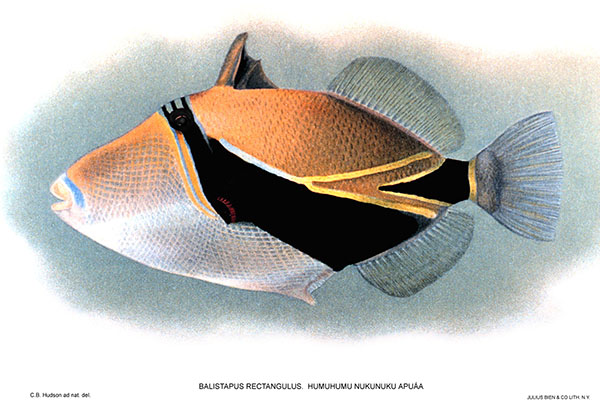
Rectangulus or HumuHumu Triggerfish, an iconic reef species in Hawaii. Vintage print by C.B. Hudson.
Animal Activists Reject Science, Putting Lives and Jobs at Risk
Guest commentary by Mike Bober,
President & CEO of PIJAC
On Tuesday, July 11th, 2017, Hawaii Governor David Ige vetoed Senate Bill 1240, a measure that would have placed a moratorium on new aquarium fishing permits and would have damaged or ended the aquarium fishing industry in Hawaii.
According to a press release issued by his office, the governor “has concerns that…science does not support” the bill’s declarations of harm to coral reefs and fishing populations from aquarium fishing. Contrary to misleading rhetoric from national and state activists, the governor is absolutely right.
The Potential Impacts of SB 1240
National groups like mine have weighed in on this battle because of its implications across the state and the country. Inside Hawaii, hundreds of fishers and divers would find themselves out of a job, including people on far-flung islands where other employment opportunities are limited. Additionally, the bill’s restrictions on permit issuance would have forced divers to practice their trade without a qualified partner – literally putting lives at risk.
Many popular aquarium fish are sourced from Hawaii, including the vast majority of yellow tangs in fish tanks. Senate Bill 1240 would have deprived many people across America and the world of the mental and physical benefits of aquarium fish. As noted by the Human Animal Bond Research Institute, studies over the last 30 years show that the presence of aquarium fish resulted in reduces stress in elderly participants, improved nutrition in Alzheimer’s patients, and improved diabetes management for youths and teens.
Reduced availability of aquarium fish would have other negative effects on America’s kids. SB 1240 would have reduced educational opportunities for the next generation. Aquariums, schools, and other institutions would be without the fish they need to properly instruct America’s young people, and families would have been bereft of beloved pets.
Were SB 1240 based upon sound science, an argument could be made for its passage despite the above effects. However, as the governor noted, the science to support SB 1240 simply doesn’t exist.
Considering the Science
For example, in a recent piece opposed to SB 1240, the Chairperson of the Governor’s Department of Land and Natural Resources (DLNR) outlined the 6,700 surveys conducted by DLNR since the late 1990s to learn about the effects of aquarium fishing on fish populations and coral reefs. According to Suzanne Case, her department found that aquarium fish populations in West Hawaii “are generally stable or increasing.” DLNR is not alone in its scientific assessment of aquarium fishing; biologists surveyed by the department concluded that aquarium fishing is the least problematic of factors that affect coral reefs.
Additionally, according to two leading coral reef scientists – one is a leading expert on coral reef fishes, and one ran the world’s largest aquarium in Atlanta – “The West Hawaii fishery is the best documented and monitored aquarium fishery in the world. It is a shining example of how government can help manage our natural resources effectively yet allow an industry to flourish. Its coupling of extensive protected areas with fishing restrictions should be touted as a way for all fisheries to be managed.”
The governor’s explanation veto didn’t stop Keith Dane, Hawaii Policy Director for The Humane Society, from declaring that Hawaii’s reefs and fish are damaged by aquarium fishing. And, according to Dane, SB 1240 would be a significant step in “restoring” the reefs and fish populations. Dane also said that few benefit from aquarium fishing.
None of these statements is true. According to the biologists surveyed by DLNR, aquarium fishing has a minimal, if any, effect on Hawaii’s reefs. And the industry benefits those who work in the trade, hobbyists, aquariums, educational institutions, and families across America and the world.
Absent an Honest Dialog
The Humane Society and others are not just limiting their dishonest scare tactics to science. They also misled Governor Ige about public support for SB 1240, pushing a poll that a professor of political science and polling told Ige was so flawed that it “should be given a similar level of weight comparable to political campaigns releasing internal poll data, which would not release any damaging information, only information that supports their narrative.”
Looking Forward
Since the 1990s, local fishers, government officials, and activists have worked together to improve the practice of aquarium fishing for the benefit of Hawaii’s beautiful animals and coral reefs. They have succeeded, though all parties agree that more can be done. Animal activists should look to continue being part of the solution, rather than creating a problem that wastes scarce government and industry resources that could be put towards accomplishing the activists’ proclaimed goals of improved sustainability and environmental care.
Mike Bober is President and CEO of the Pet Industry Joint Advisory Council, a trade association with members in Massachusetts and the surrounding states. PIJAC members include retailers, companion animal suppliers, manufacturers, wholesale distributors, manufacturers’ representatives, pet hobbyists, and other trade organizations.





